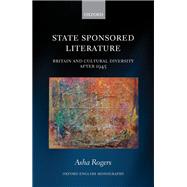State Sponsored Literature Britain and Cultural Diversity after 1945
, by Rogers, Asha- ISBN: 9780198857761 | 0198857764
- Cover: Hardcover
- Copyright: 5/17/2020
Debates about the value of the 'literary' rarely register the expressive acts of state subsidy, sponsorship, and cultural policy that have shaped post-war Britain. In State Sponsored Literature, Asha Rogers argues that the modern state was a major material condition of literature, even as its efforts were relative, partial, and prone to disruption. Drawing from neglected and occasionally unexpected archives, she shows how the state became an integral and conflicted custodian of literary freedom in the postcolonial world as beliefs about literature's 'public' were radically challenged by the unrivalled migration to Britain at the end of Empire.
State Sponsored Literature retells the story of literature's place in post-war Britain through original analysis of the institutional forces behind canon-formation and contestation, from the literature programmes of the British Council and Arts Council and the UK's fraught relations with UNESCO, to GCSE literature anthologies and the origins of The Satanic Verses in migrant Camden. The state did not shape literary production in a vacuum, Rogers argues, but its policies, practices, and priorities were also inexorably shaped in turn. Demonstrating how archival work can potentially transform our understanding of literature, this book challenges how we think about literature's value by asking what state involvement has meant for writers, readers, institutions, and the ideal of autonomy itself.
State Sponsored Literature retells the story of literature's place in post-war Britain through original analysis of the institutional forces behind canon-formation and contestation, from the literature programmes of the British Council and Arts Council and the UK's fraught relations with UNESCO, to GCSE literature anthologies and the origins of The Satanic Verses in migrant Camden. The state did not shape literary production in a vacuum, Rogers argues, but its policies, practices, and priorities were also inexorably shaped in turn. Demonstrating how archival work can potentially transform our understanding of literature, this book challenges how we think about literature's value by asking what state involvement has meant for writers, readers, institutions, and the ideal of autonomy itself.






